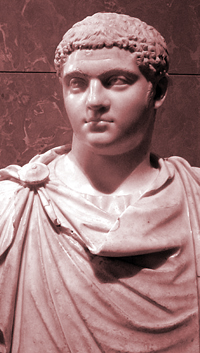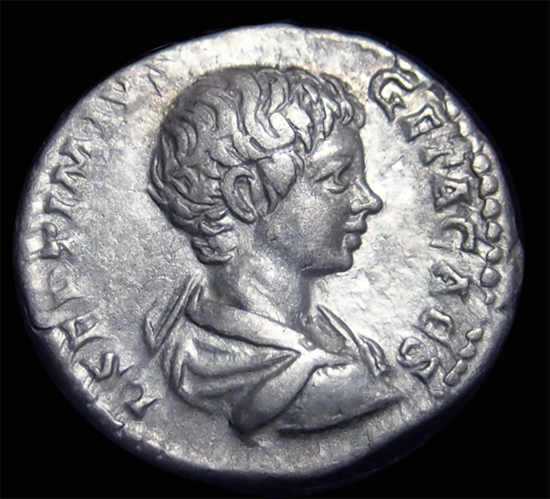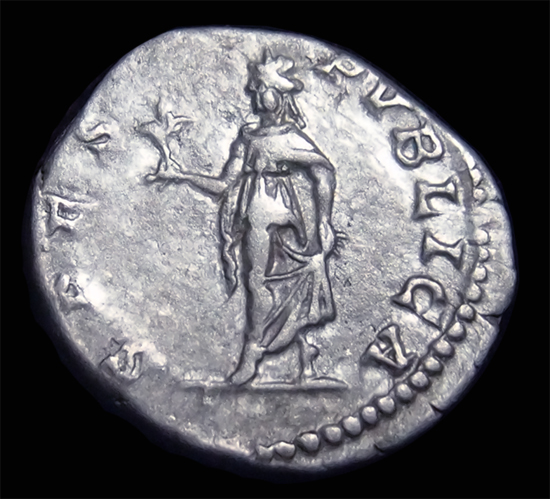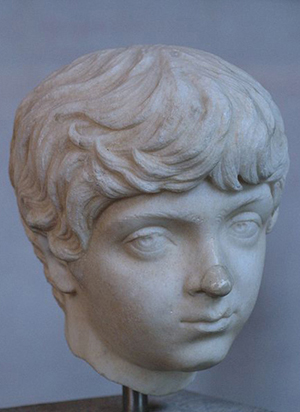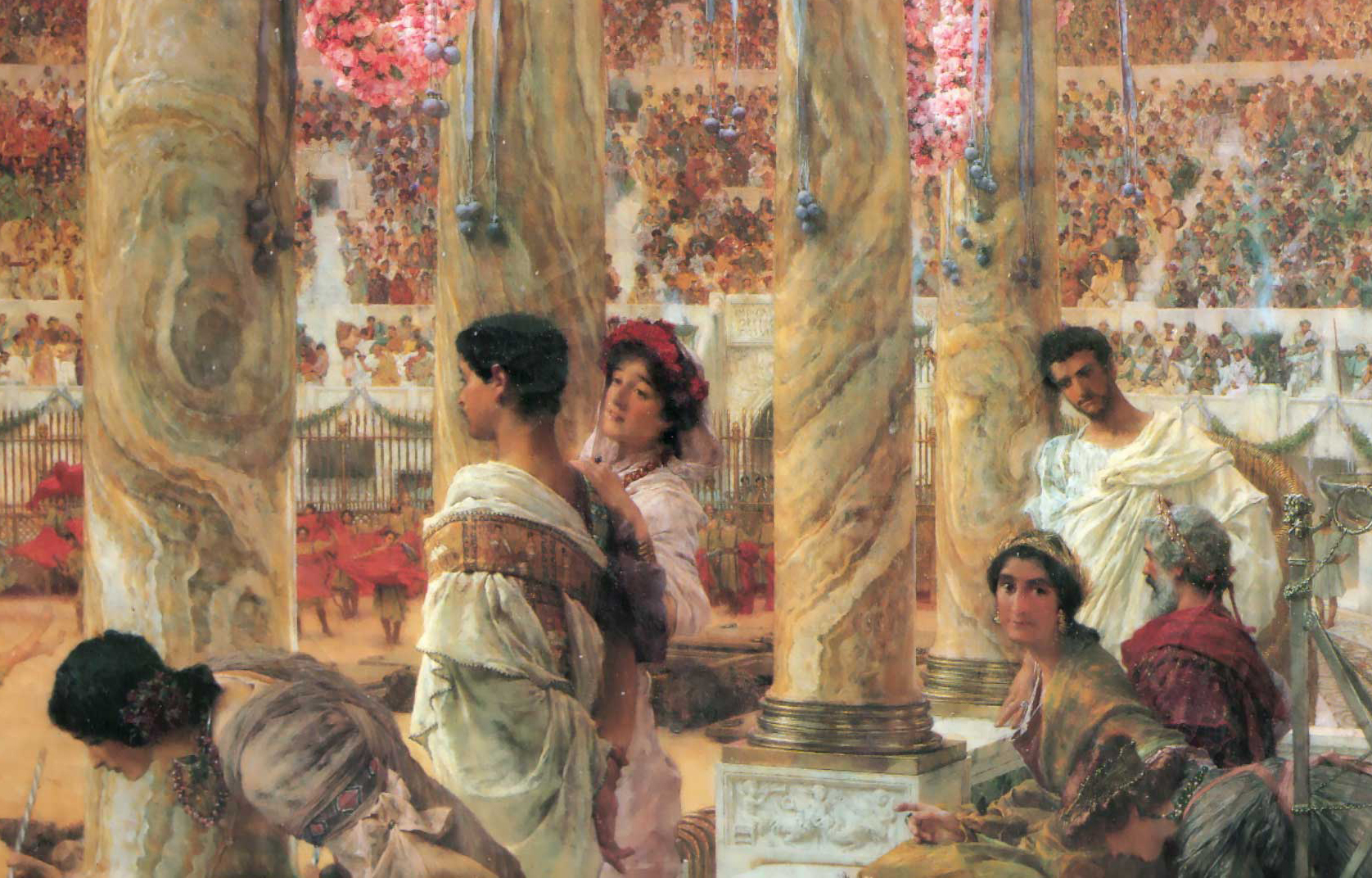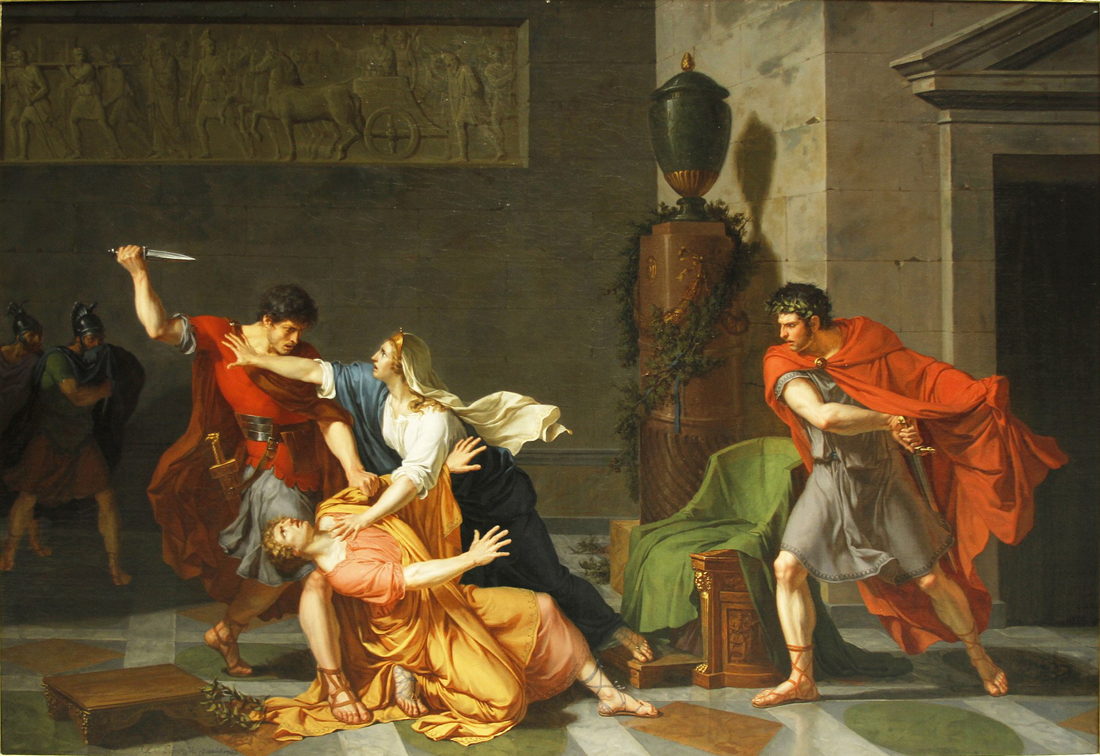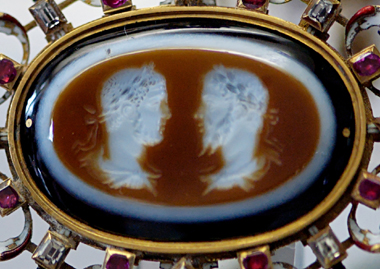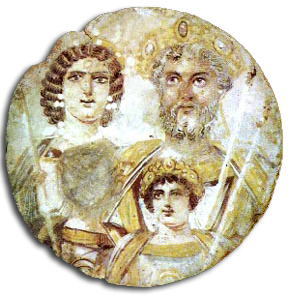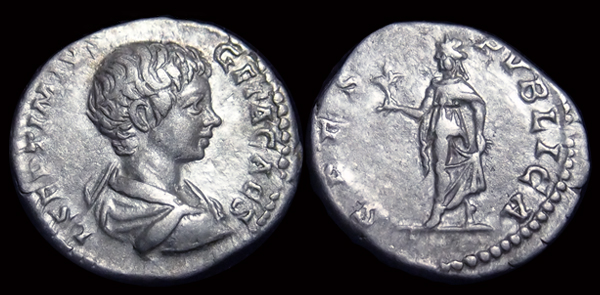
Denarius - IMP GETA (as Caesar)
(RIC 4)
Publius Septimius Geta
Born: A.D. 189
Emperor: A.D. 209-211
Obverse: Child portrait draped bust right - L SEPTIMIVS GETA CAES
Reverse: Spes advancing holding flower and raising skirt standing left - SPES PVBLICA
|
Inscriptions: L(ucius) SEPTIMIVS GETA CAES(ar) / SPES (Goddess of Hope) PVBLICA (The People) Lucius Septimius Geta Caesar / Hope of the People Geta was the younger of two sons born to the Emperor Septimius Severus and his second wife, Julia Domna. His older brother, the emperor commonly referred to as Caracalla, was a mere 11 months older. This closeness in age between the young and ambitious sons of an emperor eventually fostered rivalry between the two. When Caracalla was 7, his father changed his name from Lucius Septimius Bassianus to Marcus Aurelius Septimius Bassianus Antoninus in an effort link his family to the beloved Antonines.
His father, at the height of popularity after his successes against the Parthians, raised Caracalla, aged 10, to the rank of Augustus. This effectively made him his co-ruler and heir apparent. Geta was named Caesar, a lesser position. Although he was a second son and held a lower rank, as a member of the imperial family he enjoyed rank and privilege most of his life. As he and his brother grew into their teens, they clashed more frequently, threatening to shatter the carefully constructed image of a close nit and unified imperial family. Along with his own coin issues and statues, Septimius Severus minted coins and commissioned works of art with images of his young sons, his wife, and the family together. He promoted not just himself but his family. This was to be a dynasty.
Much of the imperial court traveled with the Emperor and his sons to Britain in 208. Caracalla supported his father in his military campaigns, Geta was given civilian authority and took a more administrative role. Septimius Severus elevated Geta to Augustus in 209, effectively making him co-ruler with himself and Caracalla. He was possibly looking to appease his younger son and ease the tension between the two brothers. Instead the rivalry only intensified. There is no doubt this move threatened Caracalla and probably emboldened Geta. Besides the general disdain each had for the other which drove them to plot the others demise, Caracalla would never share power with his younger brother as equals. Geta had no intention of taking the role of junior partner. He would not voluntarily take a lesser role to his brother as Lucius Verus did with his brother Marcus Aurelius a half century earlier. table width="94%" cellspacing="4" cellpadding="4">
On this subject the historian Cassius Dio states: "if the one attached himself to a certain faction, the other would be sure to choose the opposite side" Severus fell ill and died on February 4, 211 in York. He is said to have made one last plea to his sons to make peace but his pleas fell on deaf ears. Two brothers at odds with each other would now be expected to peacefully co-exist as joint emperors. Caracalla was 22, Geta was 21. The two brothers returned to Rome and immediately began to oppose the other on almost every issue. Government was crippled and people were forced to chose sides. It quickly became a bitter and bloody struggle between the two factions.
The Historian Cassius Dio states: "The two pretended to love and commend each other, but in all that they did they were diametrically opposed, and anyone could see that something terrible was bound to result from the situation. This was foreseen even before they reached Rome."
Although Severus shared the title of Augustus with his sons, there was little question that he retained most of the power. He used his influence to keep his two son in line as best he could. Without their fathers controlling influence, the brothers were free to finally settle their differences once and for all. This long sibling rivalry, Geta's short time as Augustus, and his life would come to an end just 11 months after his fathers death. After at least one earlier failed attempt to take his brothers life, Caracalla had Geta killed some time in late December of 211. He was 22 years old at the time of his death. Cassius Dio recounts his death. How accurate a depiction it is of his last hours is in question: "Antoninus wished to murder his brother at the Saturnalia, but was unable to do so; ... and so there now ensued many sharp encounters between the two, each of whom felt that the other was plotting against him, and many defensive measures were taken on both sides. Since many soldiers and athletes, therefore, were guarding Geta, both abroad and at home, day and night alike, Antoninus induced his mother to summon them both, unattended, to her apartment, with a view to reconciling them. Thus Geta was persuaded, and went in with him; but when they were inside, some centurions, previously instructed by Antoninus, rushed in a body and struck down Geta, who at sight of them had run to his mother, hung about her neck and clung to her bosom and breasts, lamenting and crying: "Mother that didst bear me, mother that didst bear me, help! I am being murdered." And so she, tricked in this way, saw her son perishing in the most impious fashion in her arms, and received him at his death into the very womb, as it were, whence he had been born; for she was all covered with his blood, so that she took no note of the wound she had received on her hand." Caracalla managed to either purge, exile, intimidate, or pay off all those who still stood in his way. To the senate he justified his actions as self defense. He lamented that he had been the victim of a plot and his life were in danger. In essence he murdered his brother before his brother could murder him. He also took quick steps to pacify the legions offering them rewards for their loyalty. As Cassius Dio states: "Immediately after the murder of Geta, Caracalla hurried from the Palace to the Praetorian Camp, where he declared that Geta had made a plot against him. He then promised the soldiers a donative" Septimius Severus issued coins bearing portraits of both Caracalla and Geta as young boys (examples of both can be found on this site). Both brothers also later issued coins themselves with adult portraits. In statues and adult portraits on coins, Caracalla is often depicted with and almost angry, furrowed brow, intense and imposing. Surviving depictions of Geta are often of an innocent looking child or a less imposing young man. He is seldom depicted quite as brutish as his older brother. This gives fuel to the common view of Geta as a young innocent victim of treachery and fratricide, committed by a brutish and homicidal older brother. Although he was indeed murdered by his brother, the truth is more likely that each conspired to kill the other. Geta simply failed to take his brother out before his brother got to him. Caracalla could justify his actions officially but the fact that he murdered his brother would remain a touchy subject. Helvius Pertinax was killed by Caracalla for a witticism directed towards him, probably for a joke in reference to his murder of Geta. The less than reliable Historia Augusta elaborates on the fatal faux pas: "The son of Pertinax is said to have remarked as Caracallas titles were being read aloud -- Sarmaticus Maximus and Parthicus Maximus.'Add to these also Geticus Maximus, that is to say, Gothicus.' " Of Geta as a person, there is little reliable information, Dio states: "the troops felt very kindly toward the younger brother, especially as he resembled his father very closely in appearance." Again the Historia Augusta elaborates: "As a youth, he was handsome, brusque in his manners though not disrespectful, incontinent in love, gluttonous, and a lover of food and of wine variously spiced. In his literary studies he held fast to the ancient writers. He was ever mindful of his father's sayings, always regarded by his brother with hatred, more affectionate than his brother toward their mother, speaking with a stammer though his voice was melodious. He was very fond of bright clothing — so much so, in fact, that his father would laugh at him." After Geta's murder many of his statues were destroyed, his name officially erased from inscriptions, and many coins bearing his likeness were melted down.
|

